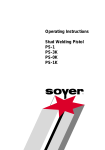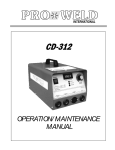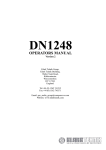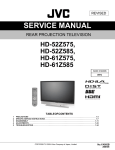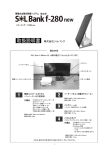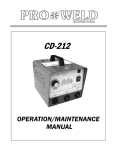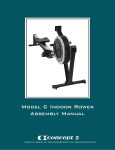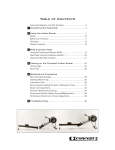Download Pro-Weld CD-212 Specifications
Transcript
OPERATION/ MAINTENANCE MANUAL PRO WEL D CD -2 1 2 GAP TABLE OF CONTENTS 1.0 INTRODUCTION 1 2.0 WARRANTY 1 3.0 UNPACKING YOUR UNIT 1 4.0 SUGGESTED SAFETY PRECAUTIONS 1 5.0 GENERAL DESCRIPTION 2 6.0 THE CD WELDING PROCESS 2 7.0 POWER REQUIREMENTS 3 8.0 SYSTEM SPECIFICATIONS 3 9.0 WELDING SYSTEM HOOK-UP 4 4 5 9.1 9.2 Straight Polarity Reverse Polarity 10.0 SYSTEM OPERATION 6 11.0 GUN SET-UP 7 7 8 8 9 9 10 11 12 13 15 11.1 11.2 11.3 11.4 11.5 11.6 11.7 11.8 11.9 11.6 Standard Installing or Changing Collets or Chucks For Weld Pins with Collet Protector Template Adapter Collet Protector with Blunt Leg Parts List Gap Gun Adjusting Gap Gun Installation of Collet Adjusting Spring Pressure Parts List LD CD Handgun 12.0 WELDABLE MATERIAL COMBINATIONS 16 13.0 CAUSES OF POOR OR ERRATIC WELDS 13 14.0 TROUBLE SHOOTING POOR WELDS 17 15.0 ROUTINE WELDER MAINTENANCE 18 16.0 ASSEMBLY –CD-212 CONTROLLER 19.20 21 16.1 PC Board Assembly Drawing 17.0 TROUBLE SHOOTING – ELECTRICAL 22 18.0 CHECK LIST CD-212 SYSTEM P.N. 100-0112 24 19.0 CHECK LIST CD-212 SYSTEM P.N. 100-0113 24 PRO WEL D CD -2 1 2 GAP LIST OF FIGURES 1 CD CONTACT PROCESS 2 2 STRAIGHT POLARITY HOOK-UP 4 3 REVERSE POLARITY HOOK-UP 5 4 FRONT PANEL LAYOUT 6 5 STANDARD GUN SETUP 7 6 COLLET PROTECTOR SETUP 8 7 TEMPLATE ADAPTER GUN SETUP 9 8 COLLET PROTECTOR/BLUNT LEG SETUP 9 9 LIGHT DUTY CD GUN 14 10 HOT WELD 17 11 COLD WELD 17 12 ARC BLOW 18 13 WELD WITHOUT FOOTPIECE 18 14 GOOD WELD 18 15 PARTS LIST 19 16 PARTS LIST (continued) 20 17 PC BOARD 21 PRO WEL D CD -2 1 2 GAP PRO WEL D CD -2 1 2 GAP PRO WEL D CD -2 1 2 GAP PRO WEL D CD -2 1 2 GAP PRO WEL D 1.0 INTRODUCTION Your new stud welding equipment is carefully constructed of the finest components and materials available. Used properly, this equipment will give you years of profitable, efficient service. The system incorporates the latest in engineering advances, for completely reliable end welding of mild steel, stainless steel, aluminum and lead free copper and brass fasteners. A careful study of this manual will enable you to understand how the welder operates to insure proper performance under all operating conditions. 2.0 WARRANTY The electrical and mechanical components of the stud welder are thoroughly performance inspected prior to assembly in the welder. The assembled welder is completely performance checked. The welder is delivered to you in functional electromechanical condition. All parts used in the assembly of the welder and its accessories are fully warranted for a period of 1 YEAR from the date of delivery. In addition, the welding capacitors are warranted for a period of 1 YEAR from the date of delivery. The printed circuit boards used in all proweld equipment are warranted for a period of 3 years. Under the warranty, the manufacturer reserves the right to repair or replace, at their option, defective parts which fail during the guarantee period. Notice of any claim for warranty repair or replacement must be furnished to the manufacturer by the purchaser within ten (10) days after the defect is first discovered. The manufacturer does not assume any liability for paying shipping cost or any labor or materials furnished where such cost are not expressly authorized in writing. The manufacturer does not warrant any parts or accessories against failures resulting from misuse, abuse, improper installation, maladjustment, or use not in accordance with the operating instructions furnished by the manufacturer. The warranty is valid only when studs are purchased from sources approved by the manufacturer or are of identical specifications to the manufacturer’s CD -2 1 2 GAP 3.0 UNPACKING YOUR UNIT Upon receipt of your unit, place it as close as possible to the point of installation before unpacking it. Do not operate the unit from an extension power cord if possible. Once the unit is unpacked it is recommended that you inspect it for any physical damage. Your unit has been completely assembled and inspected at the factory. Upon receipt, the unit must be hooked up to the recommended incoming power before welding. We recommend that you check that you have received all the items listed on the shipping check list. (see SECTION 18 or 19) Place the unit in a large enough area to provide adequate ventilation. Do not restrict the air flow through the side louvers. Do not allow water to enter the control housing. 4.0 SUGGESTED SAFETY PRECAUTIONS In any welding operation, it is the responsibility of the welder to observe certain safety rules to insure his personal safety and to protect those working near him. Reference is directed, without endorsement or recommendation, to ANSI Z49.1, Safety in Welding and Cutting, and to AWG Publication A6,1-66, Recommended Safety Practices for Gas-Shield Arc Welding. 1. Always treat electricity with respect. Under open circuit conditions, the welding machine output voltage may be dangerous. 2. Don’t work on live circuits or conductors. Disconnect the main power line before checking the machine or performing any maintenance operations. 3. Be sure the welding machine cabinet is properly grounded to a good electrical ground. 4. Don’t stand in water or on a damp floor while welding or weld in the rain. Avoid wearing wet sweaty cloths when welding. Page 1 PRO WEL D 5. Don’t operate with worn or poorly connected cables. Don’t operate weld gun with loose cable connections. Inspect all cables frequently for insulation failures, exposed wires, loose connections, and repair as needed. 6. Don’t overload welding cables or continue to operate with hot cables. 7. Don’t weld near flammable materials or liquids, in or near atmospheres, or on ducts carrying explosive gases. 8. Don’t weld on containers which have held combustible or flammable materials, or on materials which give off flammable or toxic vapors when heated, without proper cleaning, purging, or inerting. 9. Be sure to provide for proper ventilation when welding in confined spaces. CD -2 1 2 GAP The system comes complete with power cord, weld cables and gun. Just add the accessories required for the stud size to be welded. This manual should provide all the information required for you to be able to set up, weld, and maintain the CD-212 welding system. 6.0 THE CD WELDING PROCESS Contact welding is the simplest and most common method of CD stud welding. Practically foolproof, it produces no reverse side marking in most cases and is suitable for most commercial and industrial applications. First, the gun must be set-up with the proper accessories for the length and diameter stud you are going to weld. Refer to the CD Accessories Guide and CD Stud Welding Gun Section for information on accessories and gun set-up. 1 2 10. Never look at the electric arc without wearing protective eye shields. Initial Contact 11. Always use the proper protective clothing, gloves, ect. 12. Never strike an arc when near a bystander who is unaware of the dangers of ultraviolet light on their eyes. 5.0 GENERAL DESCRIPTION CD-212 HEAVY DUTY PORTABLE CD STUD/PIN WELDER The CD-212 portable CD welder is a self contained heavy duty capacitor discharge power supply capable of welding up to 1/4” flanged studs in mild steel. The CD-212 utilizes a solid state control board for longer life and has been designed for easy maintenance and field service. This welder uses standard 110 volt AC line voltage. Page 2 During Weld 3 4 Forced Into Molten Pool After Weld (FIGURE 1 CONTACT CD WELD) The stud is first placed in contact with the base material (SEE FIGURE 1). Verify that the gun is held perpendicular to the work. Pulling the trigger discharges the capacitors through the stud which vaporizes the tip. The proper tip design is critical. This is what determines the length of time of the weld. An arc is briefly sustained which melts the stud base surface and the work surface directly underneath the stud. The spring pressure in the gun then forces the stud into the molten pool, completing the weld in approximately six milliseconds. PRO WEL D This technique, when equipment is set up properly, is simple and easily mastered. The same power supply is capable of welding many different sizes and materials of fasteners. If you require assistance in selecting the proper accessories, contact our customer service department or your field representative. 7.0 POWER REQUIREMENTS 110 VOLT OPERATION 110 volt AC 60 H: Circuit protection: 20 amps; 15 amp circuit breaker (P/N: 104-0020) Integral 9 foot power cord IF EXTENSION REQUIRED Cable Length 110 Volt 12’ #16/3 25’ #16/3 30’ #14/3 50 #12/3 8.0 SYSTEM SPECIFICATIONS Weight: 26 Lbs. Size: 9” W x 11 3/4” D x 8 1/2” H 22.9 cm W x 29.8 cm D x 21.6 cm H Chassis: 14 Ga. Aluminum (Painted International Orange) Panel Controls: Power Voltage Controls Weldable Materials: Steel, Stainless steel, Aluminum, Copper, Brass, Zinc coated, Galvanized Weldable Stud Diameter: 14 Ga. Through 1/4” Flanged (Max W.B. Dia. For AL=5/16” (1/4” thread) Weld Rate: 12 per minute Weld Voltage: 45-200 VDC CD -2 1 2 GAP Weld Mode: Contact Polarity: Straight or Reverse Power Required: 110 Volt AC 60 Hz 20 Amp Circuit Protection: 15 Amp circuit breaker 3AG 1 Amp 250 volt fuses (2 on PC Board) STANDARD GUN & CABLE SPECIFICATIONS WELD GUN-LIGHT DUTY PRECISION CD CONTACT Part Number: 300-0100 B Collet Gun 300-0101 Taper Tip Gun Weight: 2 lbs. (not including cable) ( lbs. (including 25 ft. #4 weld cable & 16-4 SOW control cable) Size: 6 1/2” x 5 3/4” x 2” Weldable Stud Diameter: 14 Ga. Through 1/4” Flanged Material: High strength, impact resistant, glass fiber reinforced polycarbonate Integral Gun Cable Length: 25 feet – #4 AWG Connectors: Male Camlok / 2 Pin Hubbell Male Cables Ground Cable: (1) #4 x 15’ (P/N: 125-0100) Page 3 PRO WEL D CD -2 1 2 GAP 9.0 WELDING SYSTEM HOOK-UP 9.1 Straight Polarity (Standard Set-Up) (see Figure 2) A. Connect ground cable connector (1A) into camlok (1). The camlok should be connected into the receptacle marked GROUND. Twist until it locks. Attach “C” clamp (2) to the workpiece (5) (CLEANED AREA). B. Connect the gun control cable (3A) into the female receptacle (3). C. Connect the gun weld cable (4A) into the receptacle marked GUN (4). Twist clockwise until it locks. D. Connect AC power cable to AC outlet. NOTE: The gun welding and control cables must be laid out in a straight line. Poor weld quality may result if welding cables are coiled. 1 5 4 4A 3 1A 3A Figure 2 Straight Polarity Hook-Up Page 4 2 PRO WEL D CD -2 1 2 GAP 9.2 Reverse Polarity (Recommended for brass or galvanized) (see Figure 3) A. Connect ground cable connector (1A) into camlok (4). The camlok should be connected into the receptacle marked GUN. Twist until it locks. Attach “C” clamp (2) to the workpiece (5) (CLEANED AREA). B. Connect the gun control cable (3A) into the female receptacle (3). C. Connect the gun weld cable (4A) into the receptacle marked GROUND (1). Twist clockwise until it locks. D. Connect AC power cable to AC outlet. NOTE: The gun welding and control cables must be laid out in a straight line. Poor weld quality may result if welding cables are coiled. 1 5 4 1A 3 4A 3A 2 Figure 3 Reverse Polarity Hook-Up Page 5 PRO WEL D CD -2 1 2 GAP 10.0 SYSTEM OPERATION (see Figure 4) 1. The CD-212 is designed for simple, yet precise operation. 2. It has an “ON-OFF” rocker switch/indicator light (1) and a variable voltage control dial (2) on the front panel. 3. Before turning the unit “ON”, the voltage control knob (2) should be turned counter-clockwise to the lowest setting. 4. With all cables connected, turn the unit on by putting the rocker switch (1) in the “ON” position. The integral indicator light (1) will turn on. Setting the Weld Voltage/Capacitance 2 1 Figure 4 Front Panel Layout Page 6 Slowly turn the voltage control knob clockwise to increase the weld voltage until the indicator knob is pointing at the appropriate number for the particular stud size that you are welding. (See the set up information chart, Below). NOTE: Once the voltage control knob is set to a higher setting, turning it counter-clockwise will NOT reduce the voltage on the capacitor bank, until the toggle switch (1) is turned “OFF” (for approximately 10 seconds). The settings are marked with the voltages corresponding to various stud sizes. The approximate voltages for each stud size is as follows: 45 VDC Min. 45-80 VDC 12 ga./#6 80-120 VDC #8 120-160 VDC #10 160-190 VDC 1/4” 200VDC MAX. PRO WEL D CD -2 1 2 GAP 11.0 GUN SET-UP 11.1 STANDARD (see Figure 5) The standard gun set-up is used for welding the majority of applications. It consists of the standard adjustable face plate, two legs, a foot, B-collet, stop, and spring for your specific stud size. A step-by-step explanation of the correct way to set-up and operate the standard CD gun. To prepare for stud welding, it is necessary to have the proper accessories for the stud to be welded. Those required are the legs, footpiece, spring, collet, and appropriate screws and washers. A 3/32” and a 5/32” hex wrench are the only tools needed for the adjustment of the gun. For CD welding, the stud normally should be engaged for all but 1/4” of its length, whenever possible. Selecting the proper stop will accomplish this for you. The objective of the collet is to maintain a firm grip on the fastener to assure correct alignment and a good electrical connection, yet allow for ease of loading. Once the selection of the correct accessory is made, assembly may begin. The footpiece is mounted on the legs using 10-32 x 3/4” socket head cap screws, inserted through the holes at the base of the footpiece. These holes are recessed so that the head of the screws will not protrude. After assembling the legs and footpiece, insert the collet and stop into the open end of the gun shaft. Secure the collet in place with two set screws on the shaft. Locate the legs, with footpiece attached, in the holes provided in the gun faceplate. (It may be necessary to back off the socket screw in the faceplate to allow the legs to enter the hole). Center the opening of the footpiece around the weld end of the fastener. Tighten the footpiece in position at this time. Adjustment for the plunge which is the distance the stud protrudes beyond the end of the footpiece can now be made. This is done by loosening the two 1032 x 1/4” set screws at the bottom of the faceplate using the 3/32” Allen wrench. Then sliding the legs for proper adjustment. Refer to the set-up chart for correct plunge distance (from 1/8” to 5/16”). NOTE: Correct set-up on all CD units is 1/8”5/16” plunge. This must be assured for proper weld results in all cases. Figure 5 Standard Gun Setup Page 7 PRO WEL D The gun is now ready to weld. Select the proper setting for the size stud to be welded. Voltage is determined by the weld base diameter. Be sure your power source is set for the proper polarity: straight for steel, reverse for galvanized. 11.2 INSTALLING OR CHANGING COLLETS OR CHUCKS ( The terms collet or chuck are different names for the same device). The collet holds the pin or stud to be welded. It is secured to the gun shaft by two set screws. These screws are loosened to remove or replace a collet. Tighten these screws snugly to secure the collet in place. When you change the size of the stud you are welding, you must also change to the appropriate collet. If a collet becomes damaged or broken, it must be replaced. You may also need a stop. 11.3 GUN SET-UP FOR WELD PINS WITH COLLET PROTECTOR (see Figure 6) The collet protector has several advantages over the standard set-up. CD -2 1 2 GAP 1. It does not require a pin stop. therefore, the same setup is applicable for a range of pin lengths. 2. There is a fixed plunge, no gun adjustments necessary. 3. It provides stability at the weld end of the pin. There are two standard sizes available: 12 ga. And 10 ga. It is used with the round faceplate and three blunt legs. The collet protector slides over the collet and fastens to the chuck with three allen set screws. The insert, which takes the place of the Interal stop, is replaceable. The stud is pushed into the chuck until the flange bottoms out on the insert. The collet protector is not available for studs larger than 10 ga. The standard adjustable legs and footpiece combination can alternately be used with the collet protector as shown in Figure 10. Figure 6 Collet Protector Gun Setup Page 8 PRO WEL D 11.4 TEMPLATE ADAPTER (see Figure 7) The template adapter is used when precise location or positioning of the CD stud is required. It is used with the round faceplate and does not require a footpiece or legs. The adapter is fastened to the faceplate and provides a fixed distance between the collet and work. The plunge is set by using the correct stop in the collet. A template can then be fabricated to enable very precise locating of a particular stud. CD -2 1 2 GAP 11.5 COLLET PROTECTOR/BLUNT LEG (see Figure 8) The round faceplate, with blunt legs, can alternately be used with the collet protector as shown in Figure 8. The template adapter is available in two sizes, (1” and 1-1/4” diameter). Figure 8 Collet Protector/Blunt Leg Setup Figure 7 Template Adapter gun setup Page 9 PRO WEL D CD -2 1 2 GAP GAP GUN ITEM PART # QTY 1 3 4 5 6 7 8 9 10 11 12 13 14 15 16 17 18 19 20 F01358 M01797 F01377 M01375 F01376 F01372 M01329 F01368 F01369 F01370 F01366 F01367 F01381 M01328 M01325 F01383 F01382 M01532 M01386 3 2 1 1 1 1 2 1 1 1 1 1 1 1 1 1 1 1 6 21 F01371 1 Page 10 DESCRIPTION GROUNDING FOOT THREAD PIN M6X6 FOOT RING UNION NUT RUBBER BELLOW FINDER SLEEVE STRAIGHT PIN 3X8 WORKING PISTON FEATHER KEY RELEASE RING PISTOL SHELL LHS PISTOL SHELL RHS TRIGGER HANDLE STRAIGHT PIN 3X18 STRAIGHT PIN 3X30 PRESSURE SPRING RELEASE ARM STRAIGHT PIN 3X24 CHEESE HEADSCREW M3X10 CLAMPING RING ITEM 22 23 24 25 26 27 28 29 30 31 32 33 34 35 36 37 38 39 40 41 PART # F01373 F01372 F01378 F01379 M01371 M01332 E02091 M01387 E02093 E02121 F01414/FA M01087 M01085 E02082 E02035 E01963 F01413 M01337 F01412/FA M02108 QTY 1 1 1 1 1 2 1 1 1 1 1 1 1 1 1 1 1 1 1 1 DESCRIPTION PRESSURE SPRING SPRING GUIDE SET COLLAR ADJUSTING SCREW LOCKING RING CHEESE HEADSCREW M2X10 MICROSWITCH CABLE CLIP PROTECTION SLEEVE COMPLETE CONTROL CABLE GROUND CORD CHEESE HEADSCREW M4X10 CHEESE HEADSCREW M4X6 PROTECTION SLEEVE GROUND CABLE 25MM GROUND PLUG STRAIN RELIEF THREAD PIN M5X6 COMPLETE PISTOL CABLE** THREAD PIN M8X8 PRO WEL D CD -2 1 2 GAP Adjustment of stud welding gun Adjustment of stud collet 1. Stud 2. Collet 3. Counternut 4. Stop Screw For different stud diameters, different collets are required. Adjust collet as follows: * Loosen counternut (3) * Insert stud (1) into collet. The top edge of the stud flange must project for about .06 (1.5 mm) from the front edge of the collet. NOTE: The stud must make contact with the stop screw(4). * Adjust stop screw (4) in the collet by turning it until the distance from the top edge of the stud flange to the front edge of the collet equals .06 inches (1.5 mm). * Lock stop screw (4) by means of counternut (3). * The following table indicates which tripod leg length is required. Stud Length 0 – 1 3/8 1/2 – 1 7/8 1 – 2 3/8 2 – 3 3/8 Leg Length 2”(standard) 2 1/2” 3” 4” Part # F01358 F01359 F01360 F01361 Page 11 PRO WEL D CD -2 1 2 GAP Installation of stud collet into stud welding gun The illustration below shows how to install the stud collet into the stud welding 1. Tripod leg 2. Collet 3. Sleeve nut 4. Bellow 5. Gun shaft 6. Stud flange * Loosen sleeve nut (3) by means of a socket wrench. * Insert collet (2) into gun shaft (5) until stop * Tighten collet (2) with sleeve nut (3) NOTE: The stud flange must project from the top of the tripod legs for the thickness of the flange. If this is not the case, remove collet and correct the projection by means of stop screw. Page 12 PRO WEL D CD -2 1 2 GAP Adjustment of spring pressure The pressure with which the stud is pressed against the workpiece during the welding process is called spring pressure. The following illustration shows how to adjust the spring pressure of stud welding gun which is equipped with a spring pressure indicator. 1. Adjusting screw 2. Spring pressure indicator The spring pressure is adjusted by means of the adjusting screw (1). The adjusted pressure is indicated at the spring pressure scale (2). Adjust spring pressure as follows: * Turn adjusting screw (1) to the left until stop Indicator position 1 = low pressure * Turn adjusting screw (1) 3.5 turns to the right Indicator position 2 = medium pressure * Turn adjusting screw (1) to the right until stop Indicator position 3 = high pressure The spring pressure to be adjusted depends on the material of both welding stud and workpiece. Before starting the work, carry out some experimental weldings and test them to find out the optimum adjustment. Page 13 PRO WEL D Figure 9 Light Duty CD Gun Page 14 CD -2 1 2 GAP PRO WEL D CD -2 1 2 GAP 11.6 PARTS LIST LIGHT DUTY CD HANDGUN Part No. 300-0100 ITEM PART NO. DESCRIPTION QTY 1 033-384 GUN (CD) REAR CAP MOLDED 1 2 001-800 SPRING MAIN HEAVY SILVER 1 3 033-610 GUN (CD/DA) BEARING ASSEMBLY 1 4 033-799 GUN (CD) SHAFT TUBE 1 5 033-016 HEX HEAD CAP SCREW 3 6 033-382 GUN (CD/DA/FA) TRIGGER SPRING 1 7 049-955 M SCREW SET MS, BRASS PLT 2 8 NOT USED GUN (CD/DA/FA) CABLE CLAMP (ALUM. BLOCK) 1 9 033-404 TRIGGER SWITCH 1 10 033-381 GUN (CD/DA/FA) TRIGGER BUTTON MOLDED 1 11 036-496 GUN (FL) SHAFT BLOCK – A 1 12 033-662-25 GUN WELD CABLE (25 FT.) 1 13 033-658-25 GUN CONTROL CABLE (25 FT.) 1 14 033-881 GUN BODY RH & LH STD.CD MACHINED 1 15 033-445 GUN (CD/FL) SHAFT BOOT ASSY 1 16 033-447 GUN (CD) SHAFT BOOT RETAINING RING 1 17 033-665 GUN (CD) FACEPLATE – STD. ADJUSTABLE 1 18 033-446 GUN (CD) SHAFT BOOT SNAP RING 1 19 033-608 GUN (CD) WELD PIGTAIL ASSY 1 20 018-375 SCREW PAN HEAD 2 21 016-876 WASHED, LOCK INTO. TOOTH 1 22 033-757 LEG (CD) STD.ADJ. 7” 2 REF. 23 009-929 FLAT WASHER 2 REF. 24 016-378 SOCKET HEAD CAP SCREW 2 REF. 25 028-833 STD. FOOTPIECE 1 REF. Page 15 PRO WEL D CD -2 1 2 GAP 12.0 WELDABLE MATERIAL COMBINATIONS BASE MATERIAL STUD MATERIALS Mild Steel (1008-1018) Mild Steel 1008, 1018 Stainless Steel 304, 305 Brass 65-35, 70-30 Copper, Silicon/Bronze Galvanized Sheet (duct-”Q” Decking Mild Steel 1008-1018 Stainless Steel 304,305 Structural Steel (Must Be Clean) Mild Steel 1008,1018 Stainless Steel 304,305 Brass 65-35, 70-30 Aluminum – Most alloys of the 1100, 3000 and 5000 series. Aluminum 1100,5356 Zinc Alloys (Die Cast) Aluminum 1100, 5356 Medium Carbon Steel (1030-1018) Mild Steel 1008, 1018 Stainless Steel 304,305 Brass 65-35, 70-30 Lead Free Brass Lead Free Rolled Brass Electrolytic Copper Mild Steel 1008, 1018 Stainless Steel 304, 305 Copper, Silicon/Bronze Page 16 PRO WEL D CD -2 1 2 GAP 13.0 CAUSE OF POOR OR ERRATIC WELDS 12. Incorrect spring. (REPLACE WITH PROPER SPRING) 1. Loose collet. Does not grip stud tightly. (REPLACE) Not enough engagement of stud to collet. (CHANGE STOP) 13. Poor stud quality. 2. Fault or loose ground connection. (REPAIR OR TIGHTEN) 14.0 TROUBLE SHOOTING POOR WELDS 3. Poor surface condition of base material, excessive oil, grease, rust, ect. (CLEAN) 4. Voltage or capacitance setting too low or too high. (ADJUST TO DIAMETER OF STUD) 5. Broken or loose cables. (REPAIR) 6. Dirt in gun. (CLEAN) 7. Incorrect polarity. (CABLES HOOKED-UP WRONG) 8. Use of center punch or deep scribe. (DO NOT USE CENTER PUNCH OR DEEP SCRIBES) Figure 10 Weld too Hot Weld too Hot A) Decrease voltage. B) Decrease capacitance. C) Increase stud protrusion. D) Increase spring pressure. 9. Cables too closely coiled. 10. Arc blow is evidenced by “one side” welds. In severe cases there will be no melting under one edge of flange while the opposite side is gouged out or appears excessively hot. The principle cause of arc blow is magnetic field induced by the current flow during the weld. It occurs most often on long, narrow strips of metal or near edges of sheets or plates. In some cases, a change in grounding positions, or two grounds on the work piece, one at each end or edge of work, will correct the problem. For assistance in severe cases, contact your local sales representative. 11. Incorrect plunge setting. (ADJUST TO PROPER SETTING) Figure 11 Weld too Cold Weld too Cold A) Increase voltage. B) Increase capacitance. C) Decrease stud protrusion. D) Decrease spring pressure. Page 17 PRO WEL D CD -2 1 2 GAP 15.0 ROUTINE WELDER MAINTENANCE Your CD-212 is designed for long service with minimum care. Ordinary common sense maintenance will keep it operating efficiently. Figure 12 Arc Blow Arc Blow A) Use double grounds. B) Ground too close or not spaced Figure 13 Weld without footpiece 1. Treat the welding, ground, and control cables with respect. Avoid sharp bends and kinks which may break the cables. Don’t use the cables as a “tow line” to move the control. Avoid damage or straining the cables where they enter the gun or at the connectors. 2. It is good practice to occasionally remove the cover of the controller and clean with air and a soft brush around the components. CAUTION Be sure the controller is disconnected from the power before removing the protective cover. Weld without footpiece A) Use standard footpiece. B) Use template adapter. C) Use tripod blunt legs. 3. While the cover is removed, tighten all the weld cable connections and make sure all the screws on the capacitor terminals are torque to 30 inchpounds. NOTE: Keep the gun free of dust, dirt or foreign material Figure 14 Good Weld Page 18 PRO WEL D CD -2 1 2 GAP 16.0 ASSEMBLY CD-212 CONTROLLER (see Figure 15,16, & 17) 13 12 11 10 9 8 13a 7 1 6 2 3 4 5 Figure 15 Parts List ITEM 1 2 3 4 5 6 7 8 9 10 11 12 13 13a DESCRIPTION Chassis SCR Mounting Main SCR Capacitor (3) Transformer PC Board Discharge Resistor Safety Discharge SCR Charging SCR Buss Bar Diode Charging Bridge Buss Bar 150K 2 Watt PART NUMBER 101-0025 124-0026 108-0001 106-0023 105-0017 600-0013 112-0041 108-0042 108-0002 124-0034 108-0027 108-0017 124-0035 111-0002 Page 19 PRO WEL D CD -2 1 2 GAP 18 14 17 16 15 Figure 16 Parts List (continued) ITEM 14 15 16 17 18 Page 20 DESCRIPTION Knob Female Camlok (2) 2-Pole Female Hubbell Power Switch Circuit Breaker PART NUMBER 102-0060 107-0002 107-0031 104-0013 104-0020 PRO WEL D CD -2 1 2 GAP V4 R23 C6 R20 + V5 R17 D6 R16 V3 R18 R12 D1 OP2 OP1 + C8 R26 R24 D9 C3 R9 V2 R4 D2 OP3 R25 R5 + D4 R22 V1 C1 C5 D5 R14 R21 ZD2 C7 D7 + R7 R8 R15 V6 R11 C2 C4 + R6 ZD1 R10 R13 16.1 PC BOARD ASSEMBLY DRAWING FU1 and FU2 are 3AG 1 ampere fuses R19 D8 D10 D11 R3 D3 R2 D12 D13 R1 F1 F2 Figure 17 PC Board Page 21 PRO WEL D CD -2 1 2 GAP 17.0 TROUBLE SHOOTING – ELECTRICAL When troubleshooting the power unit/controller (welder), the following precautions must be observed: 1. Welder must be TURNED OFF! 2. Unplug power cable from welder and wait at least two minutes before checking components. 3. The use of a volt/ohmmeter is recommended where any voltage may be present. 4. Use a continuity tester ( or troubleshooting light) for continuity checks only. 5. Possible causes marked with a star (*) are generally the most common problems. PROBLEM POSSIBLE CAUSE CORRECTIVE ACTION 1. Welder does not turn on and will not weld. A. Power connections at Welder or 110 VAC outlet not complete. Check connections. *B. Broken power cable or loose wire connection in the plug. Check wires for continuity. Repair break. C. Fuse blown. Replace fuse. *A. Shorted weld capacitor. Check safety vent seal for Rupture hole. Replace defective capacitor. B. Shorted rectifier (BR1) Check for a short across the rectifier with ohmmeter. Replace rectifier module if shorted. C. Incorrect primary hookup. Check transformer connections. D. Shorted transformer assembly. Replace transformer. 2. Fuse blows each time unit is turned on. Page 22 PRO WEL D CD -2 1 2 GAP PROBLEM POSSIBLE CAUSE CORRECTIVE ACTION 3. Welder turns on but does not operate A. Ground cable connections not complete. Check for continuity *B. Broken gun control cable or loose wire connection in the plug. Shorted or open trigger switch. Check continuity between pins on control plug while trigger is depressed. Should read continuity. *C. Faulty printed circuit board. Replace with new PC Board. D. Shorted weld SCR. Check with ohmmeter (should not show continuity in either direction). Replace rectifier module if shorted. A. Shorted charge SCR. Check with ohmmeter ( should not show continuity In either direction). Replace if shorted. *B. Faulty printed circuit board. Replace with new PC Board. C. Open voltage potentiometer. Replace defective voltage Potentiometer. A. Improper gun setup. Check applicable gun setup Instruction page. B. Improper grounding or cable setup or incorrect polarity. Check applicable cable setup Instruction page. C. Weld cables are coiled. Straighten out cables. D. Incorrect voltage setting. Adjust as necessary. E. Studs or pins not perpendicular to work surface. Adjust legs as necessary. Replace defective legs. 4. Weld is excessively hot regardless of voltage setting. 5. Poor and erratic welding. Page 23 PRO WEL D CD -2 1 2 GAP 18.0 CHECK LIST CD-212 SYSTEM PT. NO. 100-0112 STANDARD CD-212 WELDING SYSTEM COMPLETE WITH B-COLLET GUN AND 25’ #4 GROUND CABLE ITEM 1. 2. 3. 4. 5. DESCRIPTION PART # QTY CD-212 CONTROLLER 110 VAC GUN ASSY. B-COLLET w/INTEGRAL 25 FT.WELD & CONTROL CABLE 2-LEGS, and FOOTPIECE GROUND CABLE #4 X 15’ MANUAL, Operation and Maintenance CD-212 HEX WRENCH SET 200-0015 1 300-0100 125-0100 1 1 1 1 19.0 CHECK LIST CD-212 SYSTEM PT. NO. 100-0113 STANDARD CD-212 WELDING SYSTEM COMPLETE WITH TAPER TIP GUN AND 25’ #4 GROUND CABLE ITEM 1. 2. 3. 4. 5. Page 24 DESCRIPTION PART # CD-212 CONTROLLER 110 VAC 200-0015 GUN ASSY. TAPER TIP w/INTEGRAL 25 FT.WELD & CONTROL CABLE 2-LEGS, and FOOTPIECE 300-0101 GROUND CABLE #4 X 15’ 125-0100 MANUAL, Operation and Maintenance CD-212 HEX WRENCH SET QTY 1 1 1 1 1 MANUFACTURED BY PRO WELD MADE IN THE U.S.A.


































